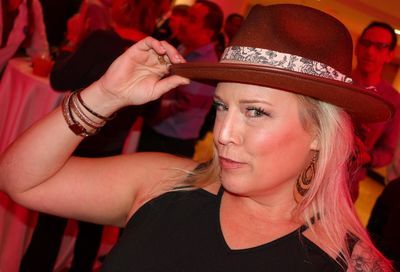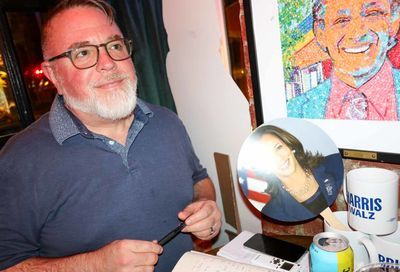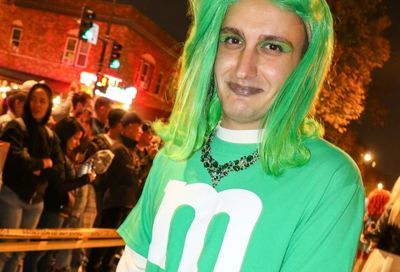Historic Harvest
Years of strategy and execution are enabling today's marriage victories
A blizzard began in Washington on Dec. 18, several hours after Mayor Adrian Fenty signed the marriage-equality bill in historic All Souls Unitarian Church. Nearly everything in town ground to a halt except the United States Senate. The Gay Men’s Chorus had to cancel the Saturday performance of its holiday concert. I stayed indoors Saturday, nursing a cold with some orange-spice tea. Rest and replenishment were the order of the day.
At the marriage-bill signing we were welcomed by All Souls Pastor Rob Hardies, a co-founder of DC Clergy United for Marriage Equality, who said that his church’s name was especially fitting for the occasion. The broad support for the bill in the religious community belied our adversaries’ false picture of God-fearing folk all on one side and godless homosexuals on the other.
Mayor Fenty acknowledged his parents and noted that, as an interracial couple, they would once have been criminals in many states. ”Marriage inequality is a civil rights, political, social, moral and religious issue in this country and many nations,” he said. ”And as I sign this act into law, the District, from this day forward, will set the tone for other jurisdictions to follow in creating an open and inclusive city.”
Openly gay Councilmember David Catania (I-At Large), the bill’s author, said that he came from a long line of ministers, and that this felt like coming home. Our second openly gay councilmember, Jim Graham (D-Ward 1), said, ”Thank God I lived to see this day.” Councilmember Phil Mendelson (D-At Large), who as Judiciary Committee chairman steered the bill to passage, said it will not force anyone to solemnize a marriage against their faith, but will give others an option they now lack.
The passage of this bill culminates decades of effort. Many who helped pave the way did not survive, including past GLAA Presidents Mel Boozer, Cade Ware, Mayo Lee and Jim Zais. Council Chairman Vincent Gray (D-At Large) told me he fondly remembered Boozer, who had attended the same high school and was working for Gray when he died.
Several city leaders have pointed out that our work is not yet done. Rev. Anthony Evans, a leader of the anti-gay forces, sounded like Churchill after the Council’s final vote: ”We will fight you in the courts, we will fight you in the Congress, we will not let you win.” Fortunately, his record of delivering on his promises falls somewhat short of Churchill’s.
The victory chorus had one sour note: an effort by the new LGBT group Full Equality Now DC to persuade the Washington Metropolitan Area Transit Authority (WMATA) to prohibit ads by the anti-gay group Stand for Marriage D.C. on city buses and in the subway. This would violate the First Amendment, since WMATA is a quasi-governmental body. I drafted a letter that was signed by several LGBT groups and the local ACLU opposing censorship and pointing out that in 1979 the then-named Gay Activists Alliance successfully sued WMATA to run our ”Someone In Your Life Is Gay” ads. We believe in responding to our opponents, not silencing them.
Gay-rights pioneer Frank Kameny, now 84, missed the signing ceremony because he was having a new furnace installed in his home on Cathedral Avenue. On Friday evening he reported that the radiators were warm, just in time for the storm. Preparation makes the difference between winning and losing, staying warm and freezing to death.
Rev. Evans and his cohorts were ill-prepared for the people of Washington, who have largely ignored their anti-gay demagoguery. Possibly contrasting with some other jurisdictions, in D.C. we have laid the groundwork not just for a legislative victory but for sustaining it. While threats remain, we are ready to face them. Spring promises to bring marriage licenses along with the cherry blossoms. It’s been a long time coming; so what’s a little snow?
Richard J. Rosendall is a writer and activist whose work has appeared on Salon.com and the Independent Gay Forum (www.indegayforum.org).
Support Metro Weekly’s Journalism
These are challenging times for news organizations. And yet it’s crucial we stay active and provide vital resources and information to both our local readers and the world. So won’t you please take a moment and consider supporting Metro Weekly with a membership? For as little as $5 a month, you can help ensure Metro Weekly magazine and MetroWeekly.com remain free, viable resources as we provide the best, most diverse, culturally-resonant LGBTQ coverage in both the D.C. region and around the world. Memberships come with exclusive perks and discounts, your own personal digital delivery of each week’s magazine (and an archive), access to our Member's Lounge when it launches this fall, and exclusive members-only items like Metro Weekly Membership Mugs and Tote Bags! Check out all our membership levels here and please join us today!


















